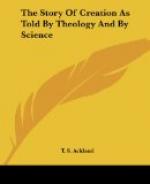Theologians are by no means agreed as to the nature and limits of that inspiration by which Holy Scripture was written. There are many who think that in matters purely incidental to its main object, and lying within the reach of human faculties, the sacred writers were left to the ordinary sources of information, and that many alleged difficulties may be removed by this view.
But whatever may be thought of the application of this hypothesis to some parts of the Bible, there are others to which it is plainly inapplicable, and of these the narrative of the Creation is evidently one. No theory of limited inspiration can be admitted to explain any supposed inaccuracies in that narrative. It cannot be liable to those imperfections which are inevitable when men have to obtain knowledge by the ordinary means, because there were no ordinary means by which such information could be obtained. The most carefully preserved records, the oldest traditions could not extend backwards beyond the moment when the first man awoke to conscious existence. For every thing beyond that point the only source of knowledge available was information derived from the Creator Himself. It may be that a revelation of this character was made to Adam in the days of his innocence, that it was carefully handed down to his descendants, and that Moses, under the divine direction, incorporated it into his history; or it may have been directly communicated to Moses by special inspiration—that matters not—but a divine revelation it must have been, or it is nothing; the dream of a poet, or the theory of a philosopher, if we can believe that such a philosopher existed at such a time. But if it be indeed a revelation from the Creator Himself, we cannot imagine that He could fall into any error, or sanction any misrepresentation with reference even to the smallest detail of His own work.
If then there are really any errors in this record—any assertions which the discoveries of science have proved to be untrue, we cannot account for them on any theory of limited inspiration. A single proved error would be fatal to the authority of the whole narrative. But, on the other hand, we are not justified in expecting such an account of the Creation as would commend itself to the scientific intellect of the present day. When we attempt to form a judgment upon it. We must look not only to its alleged author, but also to the purposes for which, the circumstances under which, and the persons to whom it was given. In these we may expect to meet with many limitations. It was not designed for the communication of scientific knowledge, it was necessarily conveyed in human language, and addressed to human intelligence, that language and that intelligence being, not as they are now, but as they were, taking the latest possible date that can be assigned to it, considerably more than three thousand years ago.




